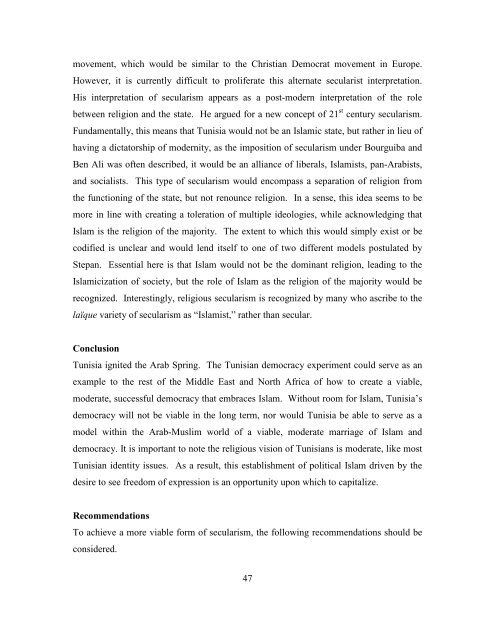Tunisia: Understanding Conflict 2012 - Johns Hopkins School of ...
Tunisia: Understanding Conflict 2012 - Johns Hopkins School of ...
Tunisia: Understanding Conflict 2012 - Johns Hopkins School of ...
Create successful ePaper yourself
Turn your PDF publications into a flip-book with our unique Google optimized e-Paper software.
movement, which would be similar to the Christian Democrat movement in Europe.<br />
However, it is currently difficult to proliferate this alternate secularist interpretation.<br />
His interpretation <strong>of</strong> secularism appears as a post-modern interpretation <strong>of</strong> the role<br />
between religion and the state. He argued for a new concept <strong>of</strong> 21 st century secularism.<br />
Fundamentally, this means that <strong>Tunisia</strong> would not be an Islamic state, but rather in lieu <strong>of</strong><br />
having a dictatorship <strong>of</strong> modernity, as the imposition <strong>of</strong> secularism under Bourguiba and<br />
Ben Ali was <strong>of</strong>ten described, it would be an alliance <strong>of</strong> liberals, Islamists, pan-Arabists,<br />
and socialists. This type <strong>of</strong> secularism would encompass a separation <strong>of</strong> religion from<br />
the functioning <strong>of</strong> the state, but not renounce religion. In a sense, this idea seems to be<br />
more in line with creating a toleration <strong>of</strong> multiple ideologies, while acknowledging that<br />
Islam is the religion <strong>of</strong> the majority. The extent to which this would simply exist or be<br />
codified is unclear and would lend itself to one <strong>of</strong> two different models postulated by<br />
Stepan. Essential here is that Islam would not be the dominant religion, leading to the<br />
Islamicization <strong>of</strong> society, but the role <strong>of</strong> Islam as the religion <strong>of</strong> the majority would be<br />
recognized. Interestingly, religious secularism is recognized by many who ascribe to the<br />
laïque variety <strong>of</strong> secularism as “Islamist,” rather than secular.<br />
Conclusion<br />
<strong>Tunisia</strong> ignited the Arab Spring. The <strong>Tunisia</strong>n democracy experiment could serve as an<br />
example to the rest <strong>of</strong> the Middle East and North Africa <strong>of</strong> how to create a viable,<br />
moderate, successful democracy that embraces Islam. Without room for Islam, <strong>Tunisia</strong>’s<br />
democracy will not be viable in the long term, nor would <strong>Tunisia</strong> be able to serve as a<br />
model within the Arab-Muslim world <strong>of</strong> a viable, moderate marriage <strong>of</strong> Islam and<br />
democracy. It is important to note the religious vision <strong>of</strong> <strong>Tunisia</strong>ns is moderate, like most<br />
<strong>Tunisia</strong>n identity issues. As a result, this establishment <strong>of</strong> political Islam driven by the<br />
desire to see freedom <strong>of</strong> expression is an opportunity upon which to capitalize.<br />
Recommendations<br />
To achieve a more viable form <strong>of</strong> secularism, the following recommendations should be<br />
considered.<br />
47
















